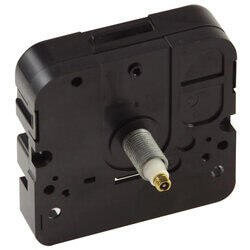
Quartz Clock Movements Open up Your VistasQuartz clock movements are the modern electronic equivalent of traditional, mechanical nerve center for timekeeping. However quartz clock movements (also known as clock electric motors) have no springtimes, weights, pulley-blocks, or equipments to track time; rather, the quartz crystal generates a stream of pulses that are very quickly and extremely constant, meaning that counting and partitioning the pulses provides an exact action of elapsed time. Let us see how these wonderful devices can open a brand-new globe to you.Non-quartz clock movements operate mechanically, utilizing rotational force to turn a flywheel and a series of equipments to figure out specific time devices (i.e., secs). Without regulation, the flywheel would spin too quick, which is where pendulums and escapement systems can be found in. The pendulum is limited to turn one degree in half a 2nd, and the gear network equates the oscillation right into seconds, min, and hours.Modern digital motors function identically-- a minimum of to the viewer-- although an entirely various strategy is used to get the exact same outcomes. The first thing one needs to comprehend is that quartz crystals naturally vibrate at their reverberating regularities when a voltage drop is put on them. Next, one should realize that the entire factor of clocks is to track elapsed time (resetting every 12 or 1 day), and that whether this is done mechanically or electronically is a non-issue.Nonetheless, the electronic approach has several advantages that go beyond merely getting rid of the mass of flywheels, weights, and gears. Electronic motors in essence digitize the whole procedure, transforming what made use of to be carried out in equipment right into software application. This gives them a lot better adaptability and versatility than their mechanical counterparts, and actually they can execute practically whatever functionality can be thought up since shows has no hardware restrictions.As an example, what if we intend to lengthen the resetting time, or the period at which everything twists around to where it began? Twelve hours and twenty-four hours are preferred choices, but there's absolutely nothing stopping one from going a complete week, and even a month!Certainly, there's no factor executing such time extensions if you could not show them, indicating specially adjusted dials and potentially an added hand. For the weekly duration, the days are printed in the facility of the dial and the (brief) extra hand leaps to the next day every 24 hours. Similarly, for once-a-month durations, dates of the month are printed along the dial's circumference and a longish hand ticks to the following once a day.A neat alternative "clock" movement that you can get monitors trend degree. The only genuine distinction is going from a solar cycle to the lunar cycle, which is 1 day and 50 minutes. The activity has to be booted up and adjusted for regional conditions, but once this is done the trend degree will always be accurate.The tide-level motion (which can be integrated with common timekeeping to display time and tide on one face), is a sort of lead-in to movements that depart from periodicity. Below, the thing revealed is a weather condition sensation, such as moisture or temperature, and the solitary hand revolves in between two extremes of a scale. Sensors are utilized to discover existing values, and the electric motor converts the worth into hand setting.The astute visitor will certainly understand that we are no more in the realm of quartz movements, as there is no reason to track elapsed time. Yet the electronic quartz modern technology has actually liberated the creative imagination to believe in terms of software instead of hardware.A fascinating by-product of all this is that there is a market for clocks and functions of the past, such as grandpa clocks with oscillating pendulums. The digital movements can suit such wishes via simulation, despite the fact that pendulums are no longer functioning parts; this is specifically important for clockmakers that desire to bring back an old, non-functioning treasure. Obviously, quartz clock movements open up your views.


